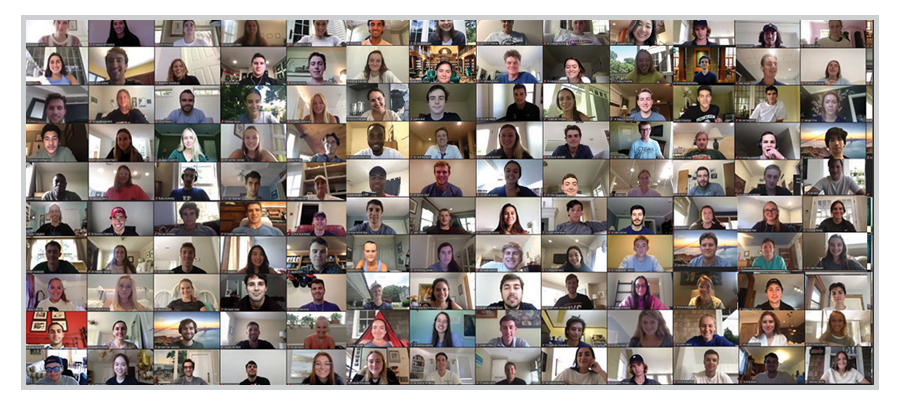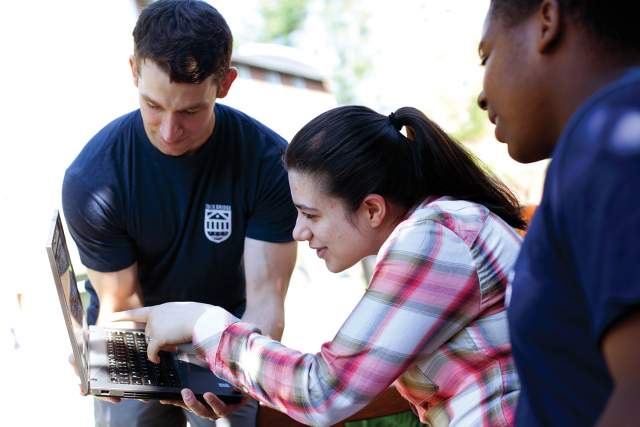An intensive three-week program of personal, connected and transformative business education for liberal arts and STEM students, Bridge makes such good sense it’s a wonder no one else had done it yet. Twenty-three years later, more than 6,000 Bridge alumni can attest to the life-changing experience of learning from Tuck MBA professors, networking with Tuck students and alumni, and obtaining crucial career guidance at a pivotal moment in their career journey.
It gives liberal arts students an opportunity to see what business education is like and the way business-minded people think, without a long-term commitment, and that’s really important for young people who are unsure of their path ahead.
Leslie Robinson
Tuck Professor and Bridge Faculty Director
“Bridge was so instrumental for me,” says Jesse LaFlamme, the owner and CEO of Pete and Gerry’s Organics, the top organic egg brand in the country. “I never expected I would love the business concepts as much as I did. They were taught so well, so memorably, it was like someone just opened the shades.”
For its entire history, Bridge has used a residential, in-person format where students develop strong bonds with their classmates and study-group members, and get to experience a little of the magic of the Tuck MBA program. This year, with the Covid-19 pandemic preventing group gatherings, that had to change. But the faculty director, Leslie Robinson, and executive director of Bridge, Lisa Tedeschi, vowed to maintain the core pillars of the program: a comprehensive business curriculum taught by Tuck faculty; a capstone project that expands students’ skillsets through team-based study; recruiting services and one-on-one career guidance; and network-building opportunities with the Tuck community.
Following the lead of the MBA program’s successful spring term of remote learning, the Bridge faculty and staff worked to shift Bridge to a remote format. Their efforts were met with the highest demand for Bridge spots in the program’s history. Without the space constraints at Tuck, the program was able to welcome 144 students in the June session, and 135 students in the July session.
During each of the three-week sessions, every class was held live and in real-time on Zoom, with planned breaks and open space in the daily schedule for career videos, office hours with professors, self-study, or exercise and relaxation. Bridge alumni hosted career panels online and volunteered to conduct 30-minute mock interviews with each participant. “Since it was virtual, we were able to reach out to our whole alumni network and then pick diverse panelists representing industries across the business spectrum to be on the alumni panels,” says Tedeschi. In addition, students had daily contact with Bridge Associates, Tuck MBA students who manage the six-person study groups, help students with their homework, guide students on their capstone project, review students’ resumes and cover letters and have one-on-one conversations about the job hunt process.
Everyone coming out of Bridge is a great team player and knows how to work in difficult situations. ... They can apply for jobs that other liberal arts students wouldn’t think they’re equipped for.
Whitney Proffitt
Bridge Recruiter and HR Manager, Bain Capital
Bill Martin D’87, a clinical professor of business administration, created Bridge’s signature capstone project 15 years ago with Tuck professor Robert Hansen, the former faculty director of Bridge. “Our goal was to draw on the conventional classroom elements of the Bridge program—accounting, business communications, finance, marketing, strategy, spreadsheeting, and organizational behavior—and have the students apply these new tools so their learning would stick,” Martin says. The best way to do that, they decided, was to have each of the study groups work on a corporate valuation of a publicly-traded company of their choosing. Throughout the three weeks, there are small deliverables students must complete, which integrate with the concepts they just learned. The final goal is to come up with a valuation and put together a PowerPoint presentation that they present to a panel of evaluators from the Tuck community who do corporate valuations all the time in their careers. The evaluators challenge some of the students’ assumptions, and the students must defend their decisions. “It turns out to be a very triumphant final day,” Martin says. “The students have done something they never thought they could do. They learned a completely new language and then presented to a group of professionals and stood up to the heat of that experience. It’s a proud moment for the students and for those of us who deliver the program.”
This year, the lessons of the capstone project extended to online presentations. The students still wore business formal attire—as in years past—but now some augmented their look with virtual backgrounds that matched the companies they were evaluating.
While the capstone project serves to strengthen the classroom learning, it also plays a huge role in the recruiting process. The project gives students a unique story to tell, and differentiates Bridge students from others who have only taken business courses but never combined their knowledge in a real-world setting. Whitney Proffitt, an HR manager at Bain Capital, has been recruiting at Bridge for eight years and has witnessed the Bridge difference. “Everyone coming out of Bridge is a great team player and knows how to work in difficult situations,” she says. “Bridgers always have the best example of situations when they had to deal with team-based conflicts and overcome it. They don’t get stuck in situations like that.” Proffitt has also seen how the Bridge curriculum gives female candidates more confidence, and shows all students that they are qualified for virtually any junior-level job in the business world—whether at a private equity firm, a finance institution, or a consulting firm. “They can apply for jobs that other liberal arts students wouldn’t think they’re equipped for,” Proffitt says. “They know that now they have the skillset and the foundation.”

Much like the residential program, virtual Tuck Bridge offers myriad opportunities for fostering connections and networking, including group team-building activities, academic simulations, and space to work directly with faculty, Bridge alumni, and current Tuck MBA students.
On the other side of this summer, the evaluations from students were as glowing as they were for the in-person sessions. “It really cemented for me the longstanding and transformative value of Bridge,” says faculty director Leslie Robinson. “It gives liberal arts students an opportunity to see what business education is like and the way business-minded people think, without a long-term commitment, and that’s really important for young people who are unsure of their path ahead."
This winter, Bridge is offering its usual December session plus a new session in January. Both are timed to coincide with the breaks in the undergraduate schedules, allowing students to use that down-time to turbocharge their business skills and apply for internships and full-time jobs.
Where will Bridge take you?
Here are profiles of six Bridge alumni that can help point the way.









